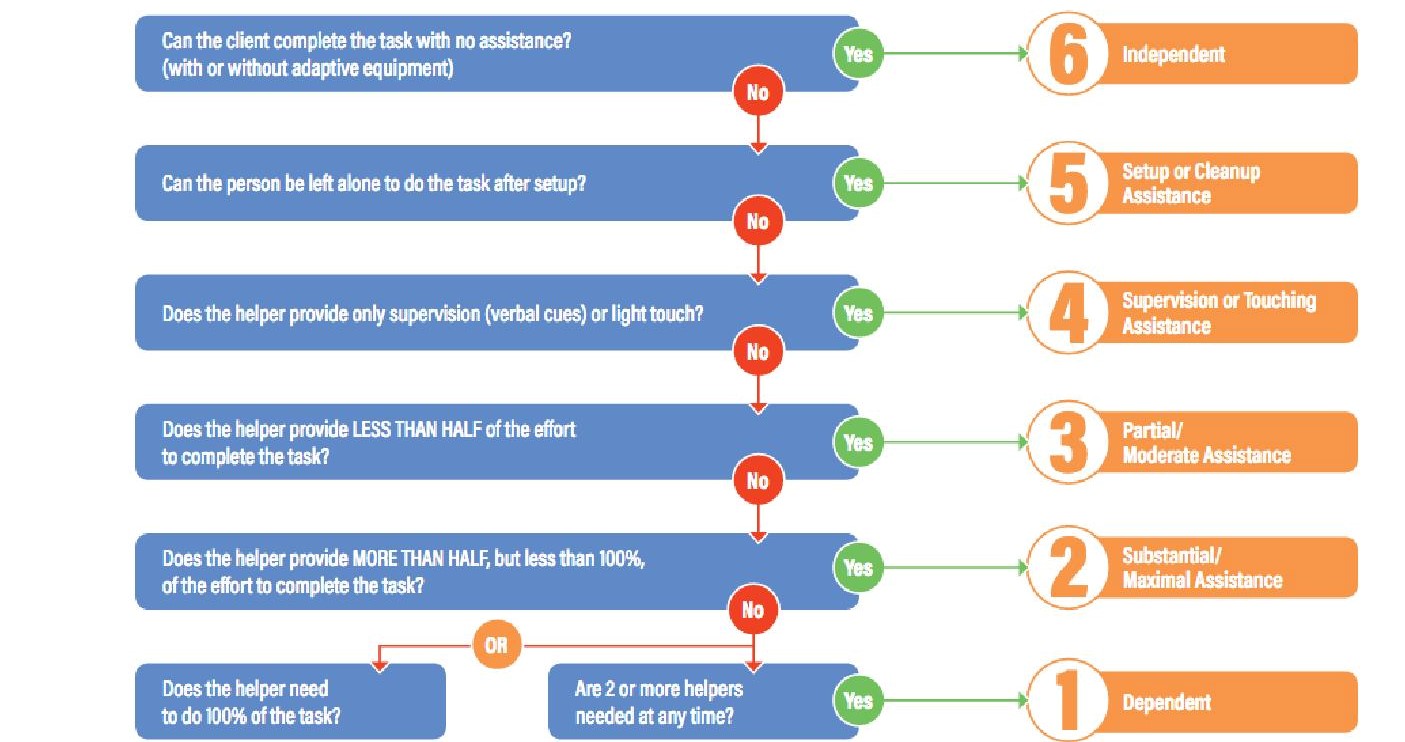SECTION GG
The Improving Medicare Post-Acute Care Transformation Act of 2014 (IMPACT Act) mandated that standardized patient assessment data elements be collected across post-acute care (PAC). Standardized data will enable cross-setting data collection, outcome comparison, exchangeability of data, and comparison of quality within and across PAC settings. In addition, standardized data has the potential to improve patient outcomes by improving coordination of care and discharge planning.
Section GG is a standardized assessment utilized by the Centers for Medicare and Medicaid Services (CMS) in post-acute care (PAC) settings which include:
• Long-Term Care Hospitals (LTCH)
• Inpatient Rehabilitation Facilities (IRF)
• Skilled Nursing Facilities (SNF)
• Home Health (HH).
CMS introduced Section GG to have a universal way to track how patients improve/decline as they move through the post-acute care continuum. This data helps CMS evaluate the services a patient receives and how it relates to functional improvements and is utilized to directly influence reimbursement.
CMS created standardized data elements that can be found at https://del.cms.gov
| Care Settings | CMS Assessment Instrument |
|---|---|
| Inpatient Rehabilitation Facilities (IRFs) | IRF Patient Assessment Instrument (IRF-PAI) |
| Home Health Agencies (HHAs) | Outcome and Assessment Information Set (OASIS) |
| Long-Term Care Hospitals (LTCHs) | LTCH Continuity Assessment Record and Evaluation (CARE) Data Set (LCDS) |
| Skilled Nursing Facilities (SNFs) | Minimum Data Set (MDS) |
| Hospice Care | Hospice Item Set (HIS) |
| Home and Community-Based Services (HCBS) | Functional Assessment Standardized Items (FASI) |
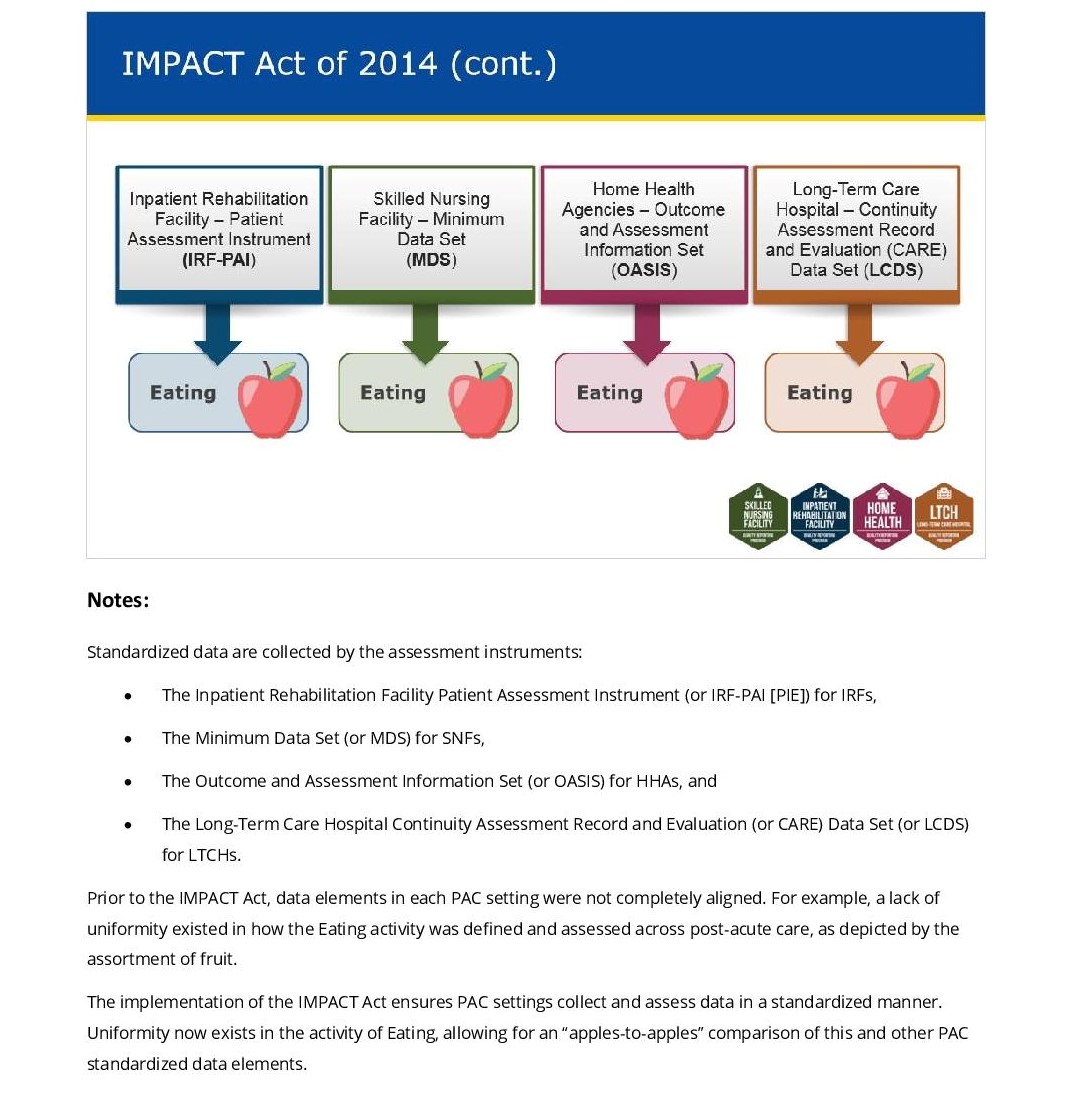
Section GG is intended to be an interdisciplinary assessment that is collected over the first 3-5 days of admission. Gathering information from multiple sources is important for accurately reporting the patient’s function. The assessment measures a patient’s need for assistance with self-care and mobility while also documenting the patient’s prior level of function.
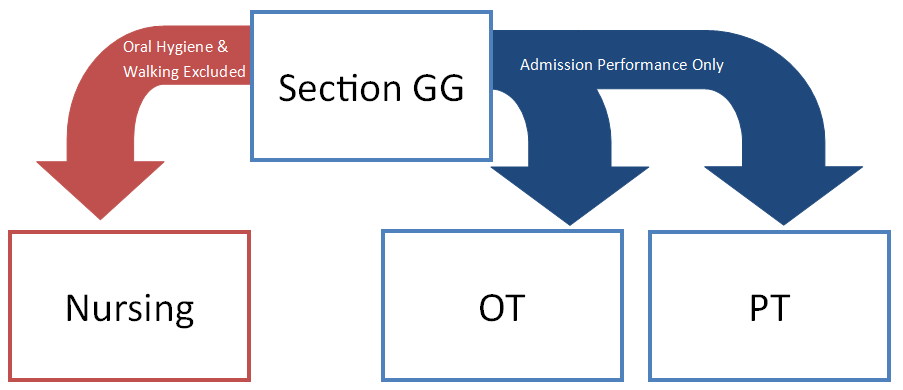
Scoring:
Guidelines for scoring Section GG indicate that the clinicians should not score the patient’s best/worst level of performance but rather the patient’s usual level of performance (how the patient performs more than 50% of the time). The way Section GG is scored does vary slightly from how an OT practitioner would typically record self-care items and assist levels. It is therefore recommended that clinicians take the CMS training prior to scoring Section GG to ensure accurate information is reported.
Skilled rehab providers will be able to contribute only to portions of section GG for which they have assessed the patient. In instances where therapy does not see a skilled need to assess or treat various areas of the self-care and mobility subsets other interdisciplinary team members can collaborate to determine appropriate coding. The discipline that completes the assessment specific to the coded area should be the discipline that contributes to the interdisciplinary team coding.
Please note: Section GG is intended to be used as an interdisciplinary tool so it is not necessary for the OT practitioner to score all items at the evaluation.
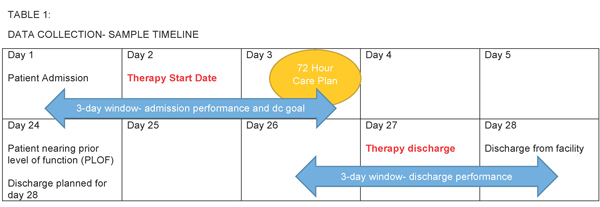 …
… 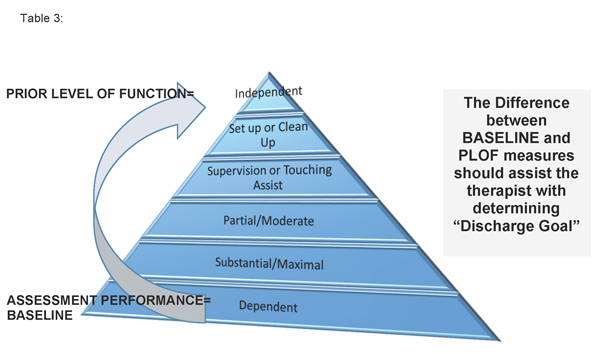
• Each item is scored on a 1-6 scale, with 6 being the most independent and 1 being the most dependent.So, the higher the overall score, the more functional and mobile the patient is.
• Scores are primarily based on the level of assistance required. Safety and Quality of Performance – If helper assistance is required because patient’s/resident’s performance is unsafe or of poor quality, score according to amount of assistance provided.
• Activities may be completed with or without assistive devices.
Section GG Scoring Definitions:
6-Independent – Patient/resident safely completes the activity by him/herself with no assistance from a helper.
5-Setup or clean-up assistance – Helper sets up or cleans up; patient/resident completes activity. Helper assists only prior to or following the activity.
4-Supervision or touching assistance – Helper provides verbal cues and/or touching/steadying and/or contact guard assistance as patient/resident completes activity. Assistance may be provided throughout the activity or intermittently.
3-Partial/moderate assistance – Helper does LESS THAN HALF the effort. Helper lifts, holds or supports trunk or limbs, but provides less than half the effort.
2-Substantial/maximal assistance – Helper does MORE THAN HALF the effort. Helper lifts or holds trunk or limbs and provides more than half the effort.
1-Dependent – Helper does ALL of the effort. Patient/resident does none of the effort to complete the activity. Or, the assistance of 2 or more helpers is required for the patient/resident to complete the activity.
If the activity was not attempted, code reason:
07-Patient/resident refused
09-Not applicable – Not attempted and the patient/resident did not perform this activity prior to the current illness, exacerbation, or injury.
10-Not attempted due to environmental limitations (e.g., lack of equipment, weather constraints)
88-Not attempted due to medical condition or safety concerns
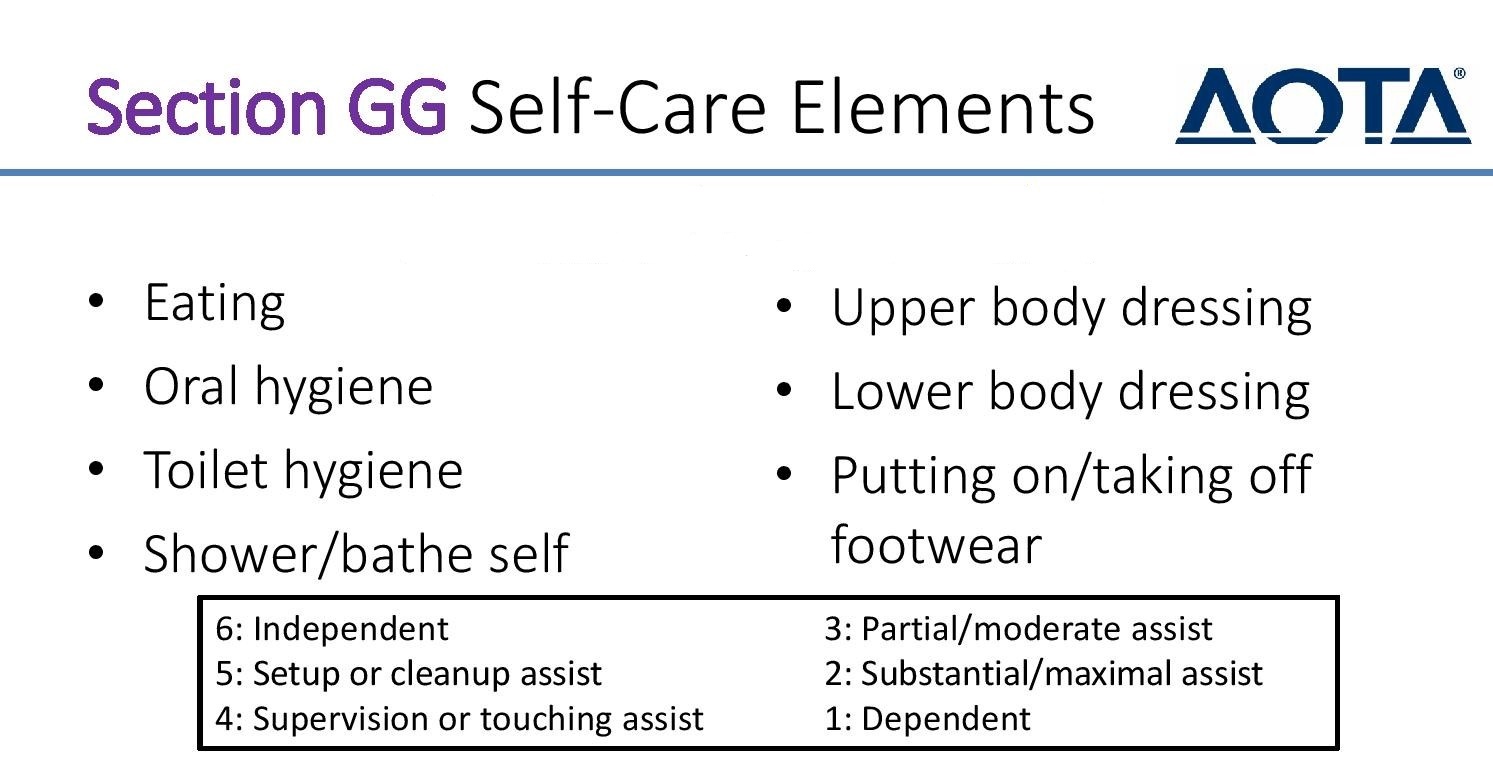
AOTA Document: Section GG Self-Care (Activities of Daily Living) and Mobility Items
This form can be used to help you score and document Section GG items as you complete your comprehensive occupational therapy evaluation. While Section GG is a standardized assessment, other assessments can and should be utilized during a comprehensive occupational therapy evaluation.
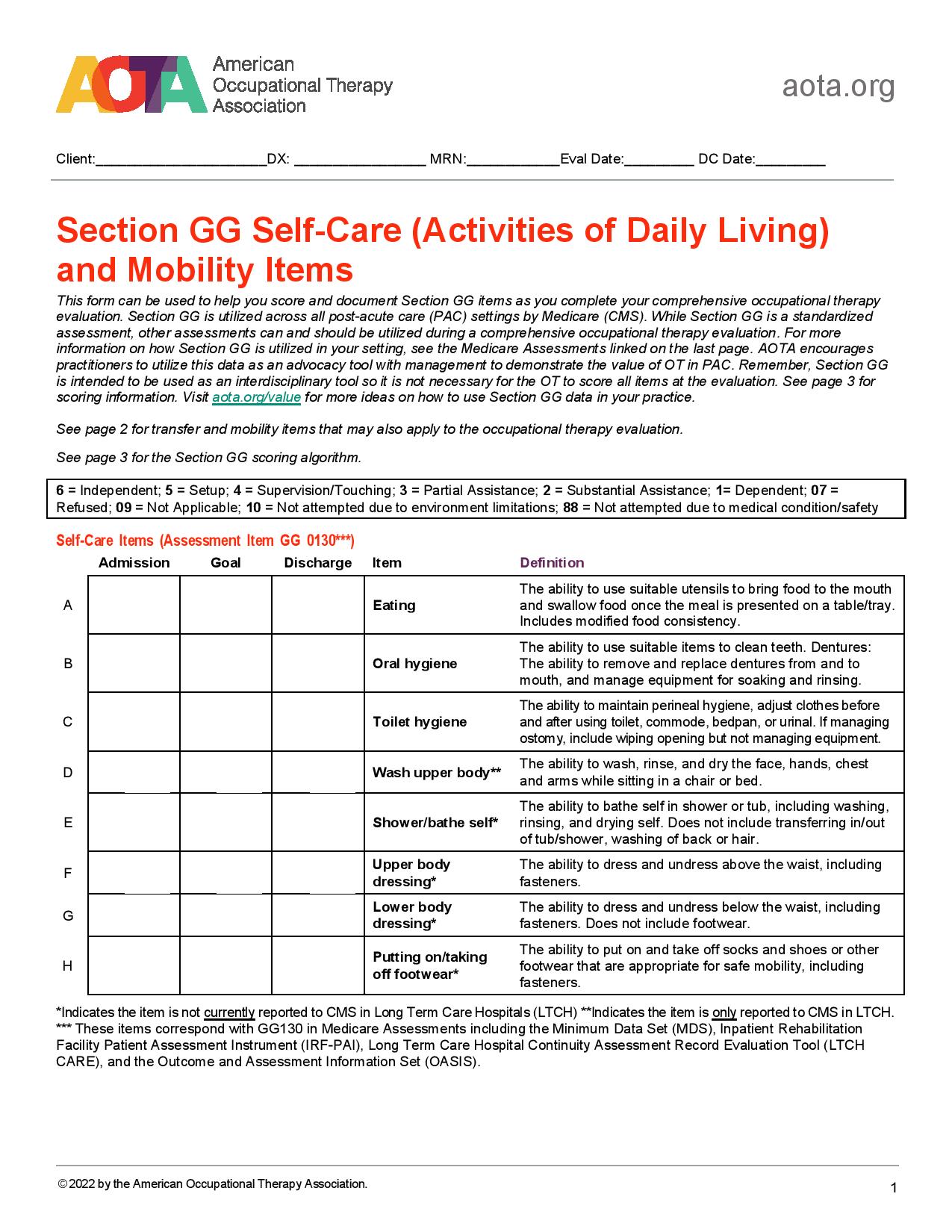
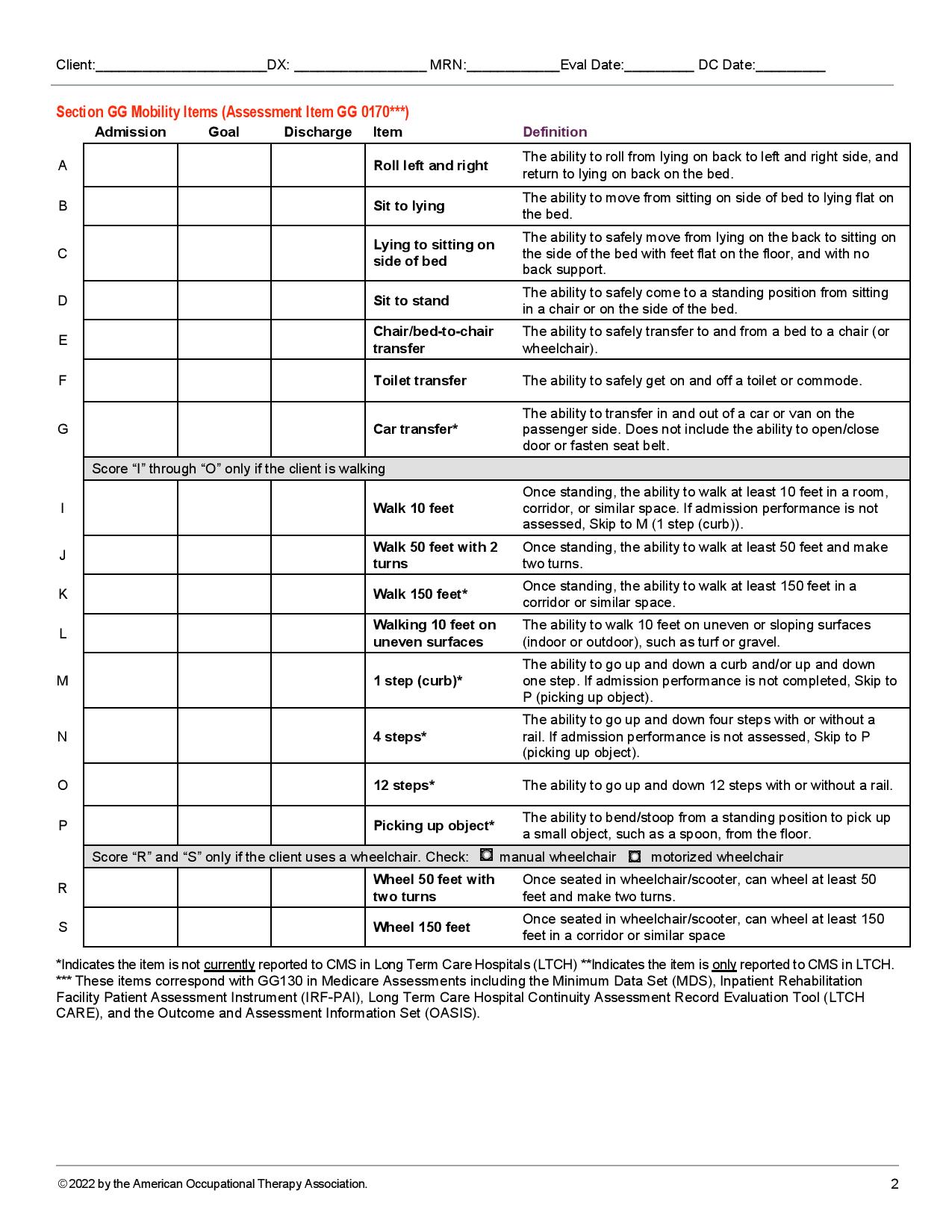
Functional Independence Measure (FIM) vs Section GG
The Functional Independence Measure (FIM) had been the gold-standard for assessing patients’ function in rehabilitation for many years. However, as of October 2019, Section GG replaced the FIM to be utilized across all post-acute care (PAC) settings by Medicare (CMS).
Please note: These 2 scales do not correlate.
| SCORE | FIM | CARE |
| 7 | Independent | |
| 6 | Modified Independent | Independent |
| 5 | Supervision | Set-up for Clean-up Assistance |
| 4 | Minimal Assistance | Supervision or Touching Assistance |
| 3 | Moderate Assistance | Partial/Moderate Assistance |
| 2 | Maximal Assistance | Substantial/Maximal Assistance |
| 1 | Total Assistance | Dependent |
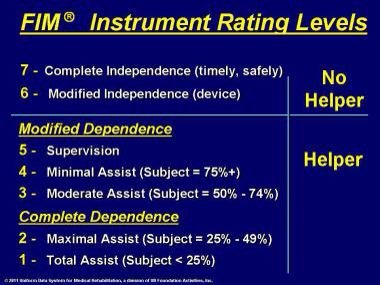
SECTION GG